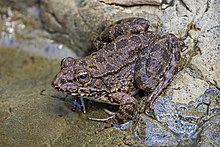Pelophylax cypriensis
| Pelophylax cypriensis | |
|---|---|

| |
| Scientific classification | |
| Kingdom: | Animalia |
| Phylum: | Chordata |
| Class: | Amphibia |
| Order: | Anura |
| Family: | Ranidae |
| Genus: | Pelophylax |
| Species: | P. cypriensis
|
| Binomial name | |
| Pelophylax cypriensis Plötner, Baier, Akn, Mazepa, Schreiber, Beerli, Litvinchuk, Bilgin, Borkin, and Uzzell, 2012
| |
Pelophylax cypriensis, the Cyprus frog or Cyprus water frog, is a species of frog in the family Ranidae. It is endemic to Cyprus.[1][2] It is widespread in Cyprus, with the highest density in the Troodos area, the most humid part of the island. It can live in both stagnant and brackish water, including small pools, streams, and ditches.[3]
Description[]
It is a medium-sized frog, with females (body length up to 75mm) being larger than males (up to 65mm). The skin is rather warty and colouration varies widely. There are four unwebbed toes on the front legs and five webbed toes on the hindlegs.[4] Males have paired external vocal sacs.[5]
Gallery[]
References[]
- ^ a b Frost, Darrel R. (2021). "Pelophylax cypriensis Plötner, Baier, Akn, Mazepa, Schreiber, Beerli, Litvinchuk, Bilgin, Borkin, and Uzzell, 2012". Amphibian Species of the World: an Online Reference. Version 6.1. American Museum of Natural History. doi:10.5531/db.vz.0001. Retrieved 31 August 2021.
- ^ "Pelophylax cypriensis". AmphibiaWeb. University of California, Berkeley. 2021. Retrieved 31 August 2021.
- ^ Baier, Felix; Sparrow, David J.; Wiedl, Hans-Jörg (2009). The Amphibians and Reptiles of Cyprus. Edition Chimaira. ISBN 978-3-89973-476-8.
- ^ Sparrow, David J. & Baier, Felix (2016). Sparrow, David J. & John, Eddie (eds.). An Introduction to the Wildlife of Cyprus. Terra Cypria. ISBN 978-9963-601-45-5.
- ^ Plötner, Jörg; Baier, Felix; Akın, Cıgdem; Mazepa, Glib; Schreiber, Robert; Beerli, Peter; Litvinchuk, Spartak N.; Bilgin, C. Can; Borkin, Leo; Uzzell, Thomas (2012). "Genetic data reveal that water frogs of Cyprus (genus Pelophylax) are an endemic species of Messinian origin". Zoosystematics and Evolution. 88 (2): 261–283. doi:10.1002/zoos.201200021. ISSN 1860-0743.
| Wikimedia Commons has media related to Pelophylax cypriensis. |
Categories:
- Pelophylax
- Amphibians of Europe
- Endemic fauna of Cyprus
- Amphibians described in 2012
- True frog stubs


